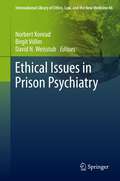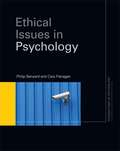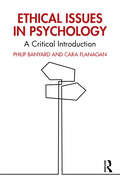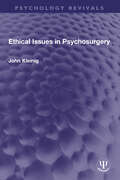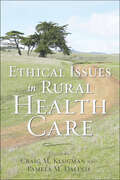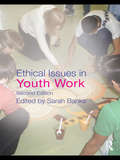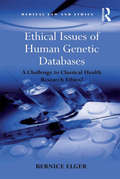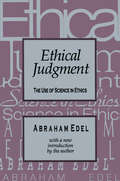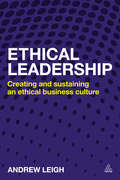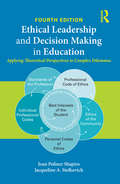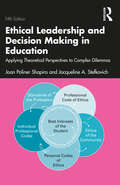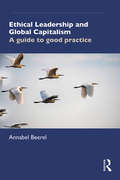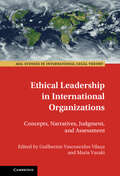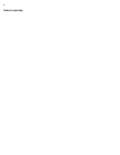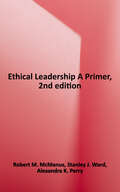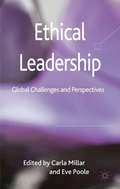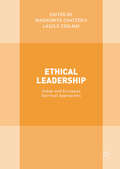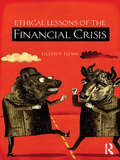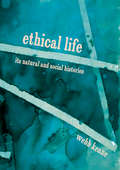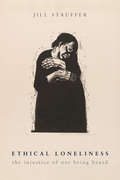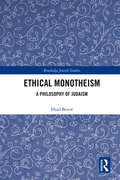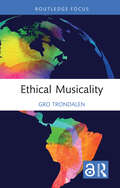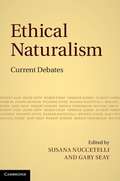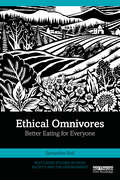- Table View
- List View
Ethical Issues in Prison Psychiatry
by Birgit Völlm David N. Weisstub Norbert KonradRecent surveys demonstrate a high and possibly increasing prevalence of mental disorders in prisoners. They have an increased risk of suffering from a mental disorder that transcends countries and diagnoses. Ethical dilemmas in prison psychiatry arise from resource allocation and include issues of patient choice and autonomy in an inherently coercive environment. Ethical conflicts may arise from the dual role of forensic psychiatrists giving raise to tensions between patient care/protection of the public.This book describes models and ethical issues of psychiatric healthcare in prison in several countries. Relevant issues are: the professional medical role of a psychiatrist and/or psychotherapist working in prison, the involvement of psychiatrists in disciplinary or coercive measures; consent to treatment, the use of coercion in forcing a prisoner to undergo treatment, hunger strike, confidentiality. The book ends with consensus guidelines concerning good practice in Prison Psychiatry.
Ethical Issues in Psychology (Foundations of Psychology)
by Philip Banyard Cara FlanaganHow do we know right from wrong, good from bad, help from hindrance, and how can we judge the behaviour of others? Ethics are the rules and guidelines that we use to make such judgements. Often there are no clear answers, which make this subject both interesting and potentially frustrating. In this book, the authors offer readers the opportunity to develop and express their own opinions in relation to ethics in psychology. There are many psychological studies that appear to have been harmful or cruel to the people or animals that took part in them. For example, memory researchers carried out studies on a man who had no memory for over forty years, but because he had no memory he was never able to agree to the studies. Is this a reasonable thing to do to someone? Comparative psychologist Harry Harlow found that he could create severe and lasting distress in monkeys by keeping them in social isolation. Is this a reasonable thing to do even if we find out useful things about human distress? If you were able to use psychological techniques to break someone down so that they revealed information that was useful to your government, would you do it? If so, why? If not, why not? These ethical issues are not easy to resolve and the debates continue as we encounter new dilemmas. This book uses examples from psychological research to look at: key ethical issues ethical guidelines of psychologists socially sensitive research ethics in applied psychology the use of animals in research This book is essential reading for undergraduate and pre-undergraduate students of psychology and related subjects such as philosophy and social policy.
Ethical Issues in Psychology: A Critical Introduction
by Philip Banyard Cara FlanaganEthical Issues in Psychology: A Critical Introduction offers readers a clear review of current ethical practices and ideas in psychology and goes on to challenge some of the agreed wisdom on ethics.Ethical issues within psychology are not easy to resolve, and debates continue as we encounter new dilemmas. This book introduces ethics and their importance, and uses examples from psychological research to consider key ethical issues; ethical principles and guidelines for psychologists, including BPS guidelines; ethics in practice in psychology; ethical problems within psychology, such as racism; and methods for ethical research, including socially sensitive research, internet-mediated research, and the use of animals in psychological research. Fully up to date, this book considers recent challenges for researchers and teachers, including privacy and consent dilemmas in the use of social media for psychological research, the rise of the open science movement and an awareness of research misconduct and fraud, and the narrow focus of psychological research that positions itself as objective and scientific while sitting in a European, and therefore predominantly White, context.Offering a comprehensive examination of ethical issues in psychology across a wide range of fields, the book encourages readers to consider the ethics-related questions they should be asking when undertaking their own research. The book is essential reading for undergraduate and pre-undergraduate students of psychology and related subjects.
Ethical Issues in Psychosurgery (Psychology Revivals)
by John KleinigFirst published in 1985, Ethical Issues in Psychosurgery examines the continuing debate surrounding the treatment of psychiatric disorder by psychosurgery and its ethical implications. Psychosurgery represents a radical treatment and it therefore raises, in a particularly acute and challenging fashion, questions which are implicit In most therapy. The book offers a focussed study in bioethics, a model for bioethical inquiry, as well as introduction to some of the major problems in bioethics. These range from detailed discussions of informed consent, the sanctity of the brain, and the use of experimental therapies, to wider questions of social contract and professionalization. John Kleinig’s balanced and informed treatment of the questions will make this book invaluable not only to those concerned with the philosophy of legal and medical ethics, but also to those in the fields of psychiatric practice and research.
Ethical Issues in Rural Health Care (Bioethics)
by Craig M. KlugmanKlugman and Dalinis initiate a much-needed conversation about the ethical and policy concerns facing health care providers in the rural United States.This volume initiates a much-needed conversation about the ethical and policy concerns facing health care providers in the rural United States. Although 21 percent of the population lives in rural areas, only 11 percent of physicians practice there. What challenges do health care workers face in remote locations? What are the differences between rural and urban health care practices? What particular ethical issues arise in treating residents of small communities? Craig M. Klugman and Pamela M. Dalinis gather philosophers, lawyers, physicians, nurses, and researchers to discuss these and other questions, offering a multidisciplinary overview of rural health care in the United States. Rural practitioners often practice within small, tight-knit communities, socializing with their patients outside the examination room. The residents are more likely to have limited finances and to lack health insurance. Physicians may have insufficient resources to treat their patients, who often have to travel great distances to see a doctor.The first part of the book analyzes the differences between rural and urban cultures and discusses the difficulties in treating patients in rural settings. The second part features the personal narratives of rural health care providers, who share their experiences and insights. The last part introduces unique ethical challenges facing rural health care providers and proposes innovative solutions to those problems. This volume is a useful resource for bioethicists, members of rural bioethics committees and networks, policy makers, teachers of health care providers, and rural practitioners themselves.
Ethical Issues in Youth Work
by Sarah BanksThis fully updated new edition of Ethical Issues in Youth Work presents a comprehensive overview and discussion of a range of ethical challenges facing youth workers in their everyday practice. The first part offers a clear outline of the nature of professional ethics, relevant ethical theories and an overview of the policy and organisational context of youth work. The second part is grounded firmly in practice, with experts in the field exploring specific issues that raise ethical difficulties for youth workers, such as: • when to breach confidentiality • information sharing in inter-professional contexts • the ethics of youth participation and active citizenship • how to balance the roles of control, empowerment and education • negotiating personal and professional values, interests and commitments in youth work • dilemmas for faith-based and black and minority ethnic workers • issues for practitioner researchers. Ethical Issues in Youth Work offers a timely and unique insight into both the dilemmas of youth work practice and some of the more recent challenges faced by youth workers and all those working with young people in the light of current public attitudes and government policies towards young people.
Ethical Issues of Human Genetic Databases: A Challenge to Classical Health Research Ethics? (Medical Law and Ethics)
by Bernice ElgerFollowing the boom in population databases in recent years there has been sustained and intense international debate about political processes and legal and ethical issues surrounding the protection and use of genetic data. As a result, several national and international organizations and committees have published widely differing guidelines and statements concerning genetic databases and biobanks. Ethical Issues of Human Genetic Databases compares the new area of biobanking with the tradition of ethically accepted classical research and highlights the distinctive features of existing databases and guidelines. The volume identifies areas of consensus and controversy while investigating the challenges posed to classical health research ethics by the existence of genetic databases, analyzing the reasons for such varying guidelines. The book will be essential to academics, biobankers, policy-makers and researchers in the field of medical ethics.
Ethical Judgment: The Use of Science in Ethics
by Abraham EdelIn Ethical Judgment, Abraham Edel makes clear the part played by biological and social scientific Information In ethical Judgment and moral action using psychological, anthropological, and economic materials as well as historical studies. Edel suggests that many controversies In ethical theory have emerged because different ethical theories made different scientific assumptions. In the almost forty years since his book was first published, life has become more complex and technological change has accelerated, bringing changes to our morality and ethical theory as well as our conduct. If anything, his observations are even more pertinent, compelling us to examine the empirical core of ethical statements., Edel maintains that since our knowledge of social life and history Is constantly growing, moral theories and ethical judgments ought to embody the best knowledge available at any point in time. However, because all knowledge and belief Is only probable, there is never absolute certainty but only what Edel calls residual Indeterminacy in human life and knowledge due to complexity and change., Edel lists four factors that form the basis for moral decisions: universal needs (food); perennial aspirations (friendships); central necessary conditions (job security); and critical contingent factors under special circumstances (land reform in a landholder-ruled society). In his new introduction, Edel applies those factors to the present day, discussing societal changes over the past forty years, such as the number of women in the work force, the impact of the civil rights movement, and the fact that isolationism as a national policy Is no longer feasible. Ethical Judgment Is a recognized classic in the modern study of ethical theory. It will be valuable reading for sociologists, historians, and all scholars interested in the study of ethics and American culture.
Ethical Leadership
by Andrew LeighEthical Leadership shines a light on the role of both culture and ethics in organizations by making the issues more transparent, accessible and above all, connected. Business leaders are now accountable for showing that they have the correct ethical policies and culture in place. Andrew Leigh focuses on the fact that ethical culture is manifest in the actual behaviour and attitudes of all staff, rather than in policy documents. His book is full of practical strategies, case studies and action points which will help leaders to improve and manage ethical culture and climate in their organizations.
Ethical Leadership and Decision Making in Education: Applying Theoretical Perspectives to Complex Dilemmas
by Joan Poliner Shapiro Jacqueline A. StefkovichThe fourth edition of the best-selling text, Ethical Leadership and Decision Making in Education, continues to address the increasing interest in ethics and assists educational leaders with the complex dilemmas in today’s challenging and diverse society. Through discussion and analysis of real-life moral dilemmas that educational leaders face in their schools and communities, authors Shapiro and Stefkovich demonstrate the application of the four ethical paradigms—the ethics of justice, care, critique, and profession. After an illustration of how the Multiple Ethical Paradigm approach may be applied to real dilemmas, the authors present a series of cases written by students and academics in the field representing the dilemmas faced by practicing educational leaders in urban, suburban, and rural settings in an era full of complications and contradictions. Following each case are questions that call for thoughtful, complex thinking and help readers come to grips with their own ethical codes and apply them to practical situations. New in the Fourth Edition: A new chapter on technology versus respect, focusing on ethical issues such as cyber-bullying and sexting. New cases on teachers with guns, the military and education, children of undocumented immigrants, homeless students, videos in bathrooms, incentive pay, first responders, private alternative high schools, verbal threats, and gaming etiquette. Updates throughout to reflect contemporary issues and recent scholarship in the field of ethical leadership. This edition adds teaching notes for the instructor that stress the importance of self-reflection, use of new technologies, and global appeal of ethical paradigms and dilemmas. Easily adaptable to a variety of uses, this book is a critical resource for a wide range of audiences, including both aspiring and practicing administrators, teacher leaders, and educational policy makers.
Ethical Leadership and Decision Making in Education: Applying Theoretical Perspectives to Complex Dilemmas
by Jacqueline A. Stefkovich Joan Poliner ShapiroThe fifth edition of the best-selling text, Ethical Leadership and Decision Making in Education, continues to address the increasing interest in ethics and assists educational leaders with complex dilemmas in today’s challenging, divided, and diverse societies. Through discussion and analysis, Shapiro and Stefkovich demonstrate the application of four ethical paradigms – the ethics of justice, critique, care, and the profession. After illustrating how the Multiple Ethical Paradigms may be applied to authentic dilemmas, the authors present cases written by graduate students, practitioners, and academics representing dilemmas faced by educational leaders in urban, suburban, and rural public and private schools and universities, in the U.S. and abroad. Following each case are questions that call for thoughtful, complex thinking and help readers apply the Multiple Ethical Paradigms to practical situations. New in the Fifth Edition are more than ten new cases that cover issues of food insufficiency, the pandemic’s effects on diverse school populations, a student’s sexual orientation, transgender students in the university, lock-down drills for young children, refugees in a Swedish school, boundaries in high school sports, generational differences in an adult diploma school, acceptance of animals on campus, and hate speech in the academy. This edition also includes teaching notes for the instructor stressing the importance of self-reflection, use of new technologies, and global appeal of ethical paradigms and dilemmas. This book is a critical resource for aspiring and practicing administrators, teacher leaders, and educational policy makers.
Ethical Leadership and Global Capitalism: A Guide to Good Practice
by Annabel BeerelThis book is a very practical guide to help managers put their own and their employees’ professional values to work. Through real life stories and case studies, the author brings to life and light the ethical challenges that present themselves in corporate and institutional settings. The reader gets to see that ethics lies not only in the big, dramatic defining moments, but in the everyday behaviors of people as they work together in the service of organizational goals. The text is punctuated with summaries, exercises, and opportunities for reflection where the reader has an opportunity to review their own ethical frameworks and to see how these show up in the daily choices they make. Ideas are provided to help managers coach their employees to strategize around ethical issues, how to communicate their views with clarity and conviction, and how to find support in the organization to tackle difficult issues.
Ethical Leadership in International Organizations: Concepts, Narratives, Judgment, and Assessment (ASIL Studies in International Legal Theory)
by Guilherme Vasconcelos Vilaça Maria VarakiThis book offers an innovative interdisciplinary approach that elucidates the importance of virtue ethics to help better understand the role of leadership in international organisations. The authors use a combination of theoretical and conceptual narratives as well as case studies to highlight both the advantages and weaknesses that the angle of virtue ethics offers. A particularly important step in times of uncertainty or crisis when the demand for leadership becomes more urgent yet more daunting. In this sense, this volume oscillates between critique and hope, since it provides a plausible, rather than a purely abstract, approach to the conceptualization and concretization of ethical leadership.
Ethical Leadership: A Primer
by Robert M. McManus Stanley J. Ward Alexandra K. PerryThe world cries out for ethical leaders. We expect the best, but we are often left profoundly disappointed. While leadership programs may feature ethics as part of their curriculum, the approach is often either simplistic or overly esoteric. This book addresses this scarcity of resources for training ethical leaders by providing a primer of several ethical frameworks accompanied by extended examples to help inform decision-making. The text also presents a number of leadership models that claim an ethical component. By providing a consistent case analysis based on the Five Components of Leadership Model, readers benefit from a uniform approach to evaluating ethical leadership. <p><p>By using the Five Components of Leadership Model as a consistent point of reference, McManus, Ward, and Perry offer readers a variety of insights on ethical leadership. Conclusions include the importance of drawing from multiple ethical and leadership perspectives, moving away from exclusively leader-centric approaches to ethical leadership, the importance of asking questions to maximize self-awareness, and considering multiple points of view whenever addressing an ethical conundrum. To connect 'ethical thinking' and 'ethical doing', the text uses classroom-friendly framing questions, timelines, visual models, summary tables, case studies, discussion questions, and recommended resources for additional study. <p><p>After reading the book, students will benefit from a foundational understanding of theories and models of both ethics and leadership, as well as a concrete view of what these theories and models look like in practice. Professors will benefit by having all these resources in one text, viewed through the lens of the Five Components of Leadership Model. <p><p>Striving to be both comprehensive and approachable, this book is an excellent resource for upper-level students studying leadership, especially those who are new to philosophy or ethics. It is inclusive enough to serve as a primary text or as a supplement for a well-rounded ethics or leadership course. <p><p>Contributors include: J. Cervantes, A. Council, B.P. Dean, G.G. Enck, R.M. McManus, B.A. Pauchnik, A.K. Perry, S. Raible, M. Saleem-Tanner, P.H. Sarkaria, L. Sequeira, M. Sowcik, J.N. Thomas, S.C. Trainor, S. Varnon-Hughes, S.J. Ward
Ethical Leadership: A Primer: Second Edition
by Robert M. McManus Stanley J. Ward Alexandra K. PerryThe world cries out for ethical leaders. We expect the best, but we are often left profoundly disappointed. While leadership programs may feature ethics as part of their curriculum, the approach is often simplistic or overly esoteric. This second edition addresses this scarcity of resources for training ethical leaders, providing a primer on several ethical frameworks accompanied by extended examples to help inform decision-making. It also addresses several leadership models that claim an ethical component. The new edition also includes new chapters on the ethics of care and toxic leadership, and new case studies for all chapters. By providing a consistent case analysis based on the Five Components of Leadership Model, readers benefit from a comprehensive approach to understanding ethical leadership. By using the Five Components of Leadership Model as a consistent point of reference, McManus, Ward, and Perry offer readers a variety of insights on ethical leadership. Conclusions include the importance of drawing from multiple ethical and leadership perspectives, moving away from exclusively leader-centric approaches to ethical leadership, the importance of asking questions to maximize self-awareness, and considering multiple points of view whenever addressing an ethical conundrum. To connect ‘ethical thinking’ and ‘ethical doing,’ the text uses classroom-friendly framing questions, timelines, visual models, summary tables, case studies, discussion questions, and recommended resources for additional study. After reading the book, students will benefit from a foundational understanding of theories and models of both ethics and leadership, as well as a concrete view of what these theories and models look like in practice. Professors will benefit by having all of these resources in one text, viewed through the lens of the Five Components of Leadership Model. Striving to be comprehensive and approachable, this book is an excellent resource for upper-level students studying leadership, especially those new to philosophy or ethics. It is inclusive enough to serve as a primary text or as a supplement for a well-rounded ethics or leadership course.
Ethical Leadership: Global Challenges and Perspectives
by Carla Millar Eve PoolePresents analysis, examples, and ideas about the future in a lively yet academically robust format. The book presents the ethical leadership dilemmas of day-to-day international business life in all their complexity, providing a range of angles, options and ideas to feed a questioning mind.
Ethical Leadership: Indian and European Spiritual Approaches
by László Zsolnai Madhumita ChatterjiThis original contribution to business ethics brings together chapters by leading European and Indian scholars and practitioners. Addressing issues of human values, ethics, spirituality and leadership in business the authors aim to create a dialogue and interchange between Indian and European cultural traditions. Topics include spiritual orientations to business in Hindu, Buddhist and Christian traditions; the effect of spirituality upon contemporary leadership theories; sustainable business models in India and Europe and a comparison between Indian and European philosophies of leadership. In exploring what India and Europe can offer to one another in the development of ethical business leadership, Ethical Leadership aims to demonstrate ways to achieve sustainability, peace and well-being.
Ethical Lessons of the Financial Crisis
by Eileen P. FlynnIn the aftermath of the economic crisis of 2008 it is important to ask what ethics has to say to the many stakeholders in the U.S. economy. The crisis in the financial industry, precipitated by the bursting of a bubble in the housing sector, brought the U.S. economy to the brink of a major depression. Government officials, economists and financial executives intervened to implement measures to mitigate the damage, applying their expertise and using their best judgments to rescue the economy. The actions they took required technical competence, pragmatic judgments and controversial decisions. They worked through a crisis to try to prevent a very bad situation from becoming a catastrophe. As events played out in the autumn of 2008, there was little time to reflect on how immoral conduct contributed to the crisis and how financial recovery needs to be built on an ethical foundation. The purpose of this book is to examine the role of ethics in setting things right. In taking a close look at the events of 2008 this book makes an important contribution to business ethics.
Ethical Life
by Webb KeaneThe human propensity to take an ethical stance toward oneself and others is found in every known society, yet we also know that values taken for granted in one society can contradict those in another. Does ethical life arise from human nature itself? Is it a universal human trait? Or is it a product of one's cultural and historical context? Webb Keane offers a new approach to the empirical study of ethical life that reconciles these questions, showing how ethics arise at the intersection of human biology and social dynamics.Drawing on the latest findings in psychology, conversational interaction, ethnography, and history, Ethical Life takes readers from inner city America to Samoa and the Inuit Arctic to reveal how we are creatures of our biology as well as our history--and how our ethical lives are contingent on both. Keane looks at Melanesian theories of mind and the training of Buddhist monks, and discusses important social causes such as the British abolitionist movement and American feminism. He explores how styles of child rearing, notions of the person, and moral codes in different communities elaborate on certain basic human tendencies while suppressing or ignoring others.Certain to provoke debate, Ethical Life presents an entirely new way of thinking about ethics, morals, and the factors that shape them.
Ethical Loneliness
by Jill StaufferEthical loneliness is the experience of being abandoned by humanity, compounded by the cruelty of wrongs not being heard. It is the result of multiple lapses on the part of human beings and political institutions that, in failing to listen well to survivors, deny them redress by negating their testimony and thwarting their claims for justice. This book examines the root causes of ethical loneliness and how those in power revise history to serve their own ends rather than the needs of the abandoned. Out of this discussion, difficult truths about the desire and potential for political forgiveness, transitional justice, and political reconciliation emerge. Moving beyond a singular focus on truth commissions and legal trials, this study considers more closely what is lost in the wake of oppression and violence, how selves and worlds are built and demolished, and who is responsible for recreating lives after they are destroyed. Ethical Loneliness boldly argues that rebuilding worlds after violence is a broad obligation and that those who care about justice must first confront their own assumptions about autonomy, liberty, and responsibility before an effective response to violence can take place. As it builds its claims, the text draws on the work of Emmanuel Levinas, Jean Améry, Eve Sedgwick, and Friedrich Nietzsche, as well as concrete cases of justice and injustice across the world.
Ethical Loneliness: The Injustice of Not Being Heard
by Jill StaufferEthical loneliness is the experience of being abandoned by humanity, compounded by the cruelty of wrongs not being acknowledged. It is the result of multiple lapses on the part of human beings and political institutions that, in failing to listen well to survivors, deny them redress by negating their testimony and thwarting their claims for justice. Jill Stauffer examines the root causes of ethical loneliness and how those in power revise history to serve their own ends rather than the needs of the abandoned. Out of this discussion, difficult truths about the desire and potential for political forgiveness, transitional justice, and political reconciliation emerge. Moving beyond a singular focus on truth commissions and legal trials, she considers more closely what is lost in the wake of oppression and violence, how selves and worlds are built and demolished, and who is responsible for re-creating lives after they are destroyed. Stauffer boldly argues that rebuilding worlds and just institutions after violence is a broad obligation and that those who care about justice must first confront their own assumptions about autonomy, liberty, and responsibility before an effective response to violence can take place. In building her claims, Stauffer draws on the work of Emmanuel Levinas, Jean Améry, Eve Sedgwick, and Friedrich Nietzsche, as well as concrete cases of justice and injustice across the world.
Ethical Monotheism: A Philosophy of Judaism (Routledge Jewish Studies Series)
by Ehud BenorThe term Ethical Monotheism is an important marker in Judaism’s tumultuous transition into the modern era. The term emerged in the context of culture-wars concerning the question of whether or not Jews could or should become emancipated citizens of modern European states. It appeared in arguments whether or not Judaism could be considered a Religion of Reason—a symbolic, motivational representation of a universal morality, and in debates about whether or not Judaism could or should reform itself into a Religion of Reason. This book is both a decisive departure from such discussions and an attempt to add a further, post-modern, statement to their ongoing development. As departure, it refuses to take for granted a philosophical conception of Religion of Reason as the standard for Ethical Monotheism according to which Judaism was to be evaluated or reformed. As continuation, the book undertakes a phenomenology of Jewish modes of ethical religiosity that allows it to inquire what kind of ethical monotheism Judaism might be. Through sophisticated analysis of select "snapshots," or "fragments of a hologram," guided by a robust theory of religion, the author discloses Judaic ethical monotheism as an ongoing wrestling with the meaning of justice. By closely examining five main "snapshots" of this long process—the Bible, rabbinic Judaism, Maimonides, The Zohar, and the modern philosophers, Buber and Levinas—the author offers his own constructive philosophy of Judaism and his own distinctive philosophy of religion. Ethical Monotheism offers a new way to think about Judaism as a religion and as a coherent philosophical debate, and demonstrates the need to integrate philosophy, history, cognitive psychology, anthropology, theology, and history of science in the study of "religion."
Ethical Musicality (Music and Change: Ecological Perspectives)
by Gro TrondalenEthical Musicality addresses the crossroads between music and ethics, combining philosophical knowledge, theoretical reflection, and practical understanding. When tied together, music and ethics link profoundly, offering real-life perspectives that would otherwise be inaccessible to us. The first part elucidates music and ethics through some influential and selected scholars ranging from Antiquity via modern philosophy to contemporary voices. In the second part, different roles and arenas are illustrated and explored through various music practices in real-life encounters for the musician, the music educator, the music therapist, the musicologist, the ‘lay’ musician, and the music researcher. The third part unfolds an ethical musicality focusing on the body, relationship, time, and space. Following these fundamental existentials, ethical musicality expands our lifeworld, including context, involvement, power, responsibility, sustainability, and hope. Such an ethical musicality meets us with a calling to humanity - offering hope of a ‘good life’.
Ethical Naturalism
by Susana Nuccetelli Gary SeayEthical naturalism is narrowly construed as the doctrine that there are moral properties and facts, at least some of which are natural properties and facts. Perhaps owing to its having faced, early on, intuitively forceful objections by eliminativists and non-naturalists, ethical naturalism has only recently become a central player in the debates about the status of moral properties and facts which have occupied philosophers over the last century. It has now become a driving force in those debates, one with sufficient resources to challenge not only eliminativism, especially in its various non-cognitivist forms, but also the most sophisticated versions of non-naturalism. This volume brings together twelve new essays which make it clear that, in light of recent developments in analytic philosophy and the social sciences, there are novel grounds for reassessing the doctrines at stake in these debates.
Ethical Omnivores: Better Eating for Everyone (Routledge Studies in Food, Society and the Environment)
by Samantha NollThis book provides a detailed overview of ethical omnivorism, as well as the philosophical foundations of this movement and diet.Many eaters are concerned about the impact that their food choices have on the environment, animals, and human health. Ethical omnivorism is at once a new food ethic, diet, and global movement aimed at providing a flexible path for eaters committed to bringing about lasting change one meal at a time. While publications in food ethics are largely dominated by vegetarian titles, this book explores the viability of omnivorism, a dietary choice which is not devoid of animal products, but one which embraces eating local, eating organic, and eating humanely raised food products. In doing so, this diet builds on the local food movement’s desire to know where food comes from and stresses the importance of maintaining high animal welfare and environmental standards. Overall, this book provides a foundational overview of ethical omnivorism as a food movement and guidance for those interested in eating ethically, while recognizing that many factors influence dietary choices.This book will be of great interest to students and scholars of food studies, food, agriculture and animal ethics, environmental philosophy, and those more widely interested in making ethical food choices.
